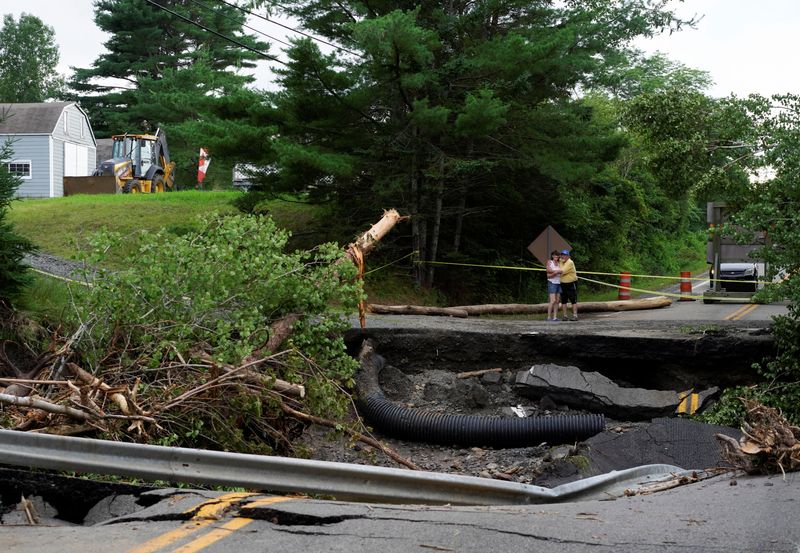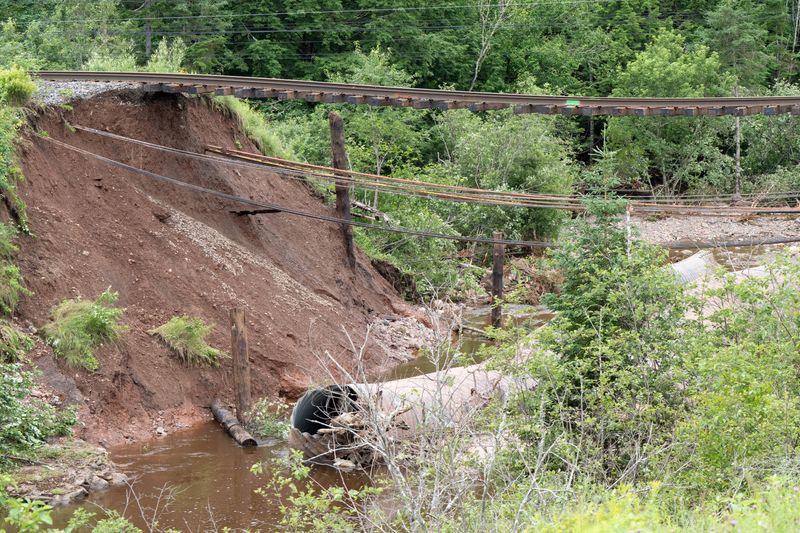By Nia Williams
(Reuters) - Canada's East Coast province of Nova Scotia began cleaning up on Sunday after torrential rainfall caused devastating floods, while the search continued for four people including two children who went missing during the deluge.
The storm, which started on Friday, in some places dumped more than 25 cm (10 inches) in just 24 hours - as much as normally falls in three months. CBC meteorologist Ryan Snoddon said it was the most rain to hit the provincial capital Halifax since Hurricane Beth in 1971.
The floods washed away roads, swamped buildings and damaged bridges and a Canadian National Railway (TSX:CNR) track used to access Canada's fourth-largest port.
Nova Scotia Premier Tim Houston described the damage as unimaginable and said the cost would likely be in the "hundreds of millions" of dollars.
Nova Scotia declared a province-wide state of emergency late on Saturday night that will last until Aug. 5.
Two children were missing near Halifax after the car they were in was submerged. In another incident, a man and a youth were missing after their car drove into deep water.
Royal Canadian Mounted Police (RCMP) on Sunday said police divers had located an empty pick-up truck in a flooded field in the West Hants area near Halifax in an underwater search and believed it was the vehicle in which the two children were travelling.
Search efforts continued in the same area for the other vehicle and all four people. Crews used industrial pumping equipment to try and lower the water level in the search area.
"There's zero visibility in that field. Our dive team located the truck by feel," said Corporal Guillaume Tremblay, public information officer with the RCMP.
At a press conference on Sunday afternoon, Houston urged people to stay away from the search area given the treacherous conditions.
Across the province, 19 bridges were damaged, another six were completely destroyed and many roads remained closed. Up to 600 people were still under evacuation orders.
"Water levels are still high in many impacted areas but they're starting to recede. The main risks at this point are our transportation challenges," Houston said. "It's incredible to see the force of the water and the impact it's had."
Houston also said there was "extensive damage" to a section of CN Rail track used by freight trains heading for the Port of Halifax, which contributes around C$4.4 billion ($3.33 billion) to Nova Scotia's annual economic output.
A CN spokesman said some repairs would be delayed until water levels subsided. "Once crews can safely complete their work, the track will be reopened," spokesman Jonathan Abecassis said in a statement.
Nova Scotia Power's outage map showed just over 2,000 customers were without electricity on Sunday, down from around 80,000 at the height of the storms.

The flooding was the latest weather-related calamity to pound Canada this year. Wildfires have set a size record and sent clouds of smoke into the United States. Earlier this month, heavy rains caused floods in several eastern U.S. states.
($1 = 1.3222 Canadian dollars)
